Complex Project Management: Analysis of Causes, Tools & Techniques
VerifiedAdded on 2023/06/07
|21
|6859
|55
Essay
AI Summary
This essay delves into the multifaceted aspects of complex project management, examining the causes of project complexity, including time constraints, cost overruns, technological integration, resource management, organizational structure, employee skills, uncertainty levels, and unclear project goals. It discusses theories related to project complexity, such as interdependencies and coordination, time constraints, and uncertainty. The essay differentiates between simple, complicated, and complex projects, using the analogy of piloting strategies. Furthermore, it explores specific causes of project complexity, such as unhelpful employee behavior, ineffective synchronization of project activities, inappropriate project model selection, and ineffective strategic management systems. It also addresses environmental factors contributing to project complexities and discusses the implications and issues surrounding complex project management. The essay highlights various tools and techniques that aid project managers in managing complex projects, emphasizing the efficiency and effectiveness of these tools in ensuring project success. This document is available on Desklib, a platform providing study tools and resources for students.

roject ManagementP
Paraphrase This Document
Need a fresh take? Get an instant paraphrase of this document with our AI Paraphraser
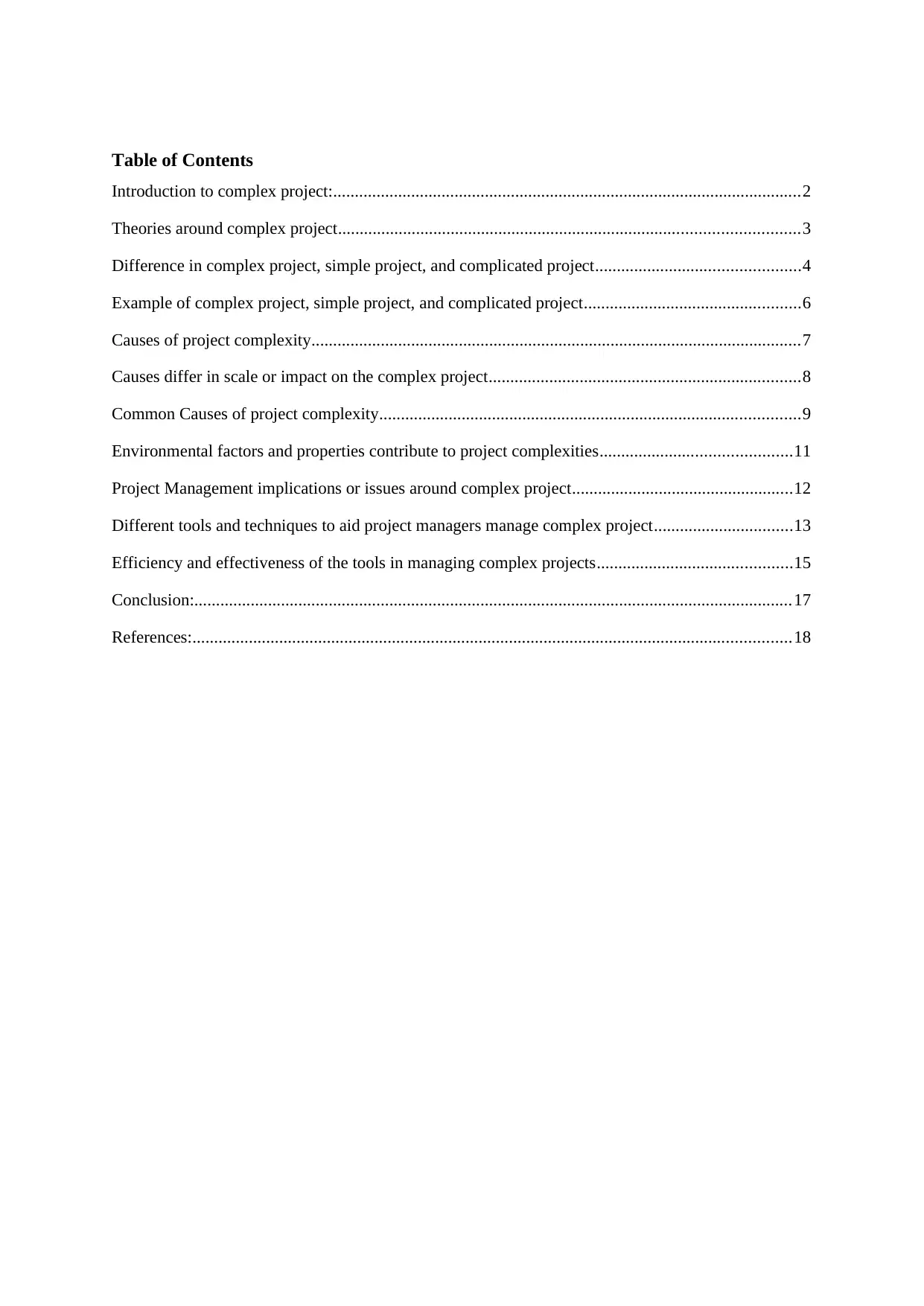
Table of Contents
Introduction to complex project:............................................................................................................2
Theories around complex project..........................................................................................................3
Difference in complex project, simple project, and complicated project...............................................4
Example of complex project, simple project, and complicated project..................................................6
Causes of project complexity.................................................................................................................7
Causes differ in scale or impact on the complex project........................................................................8
Common Causes of project complexity.................................................................................................9
Environmental factors and properties contribute to project complexities............................................11
Project Management implications or issues around complex project...................................................12
Different tools and techniques to aid project managers manage complex project................................13
Efficiency and effectiveness of the tools in managing complex projects.............................................15
Conclusion:..........................................................................................................................................17
References:..........................................................................................................................................18
Introduction to complex project:............................................................................................................2
Theories around complex project..........................................................................................................3
Difference in complex project, simple project, and complicated project...............................................4
Example of complex project, simple project, and complicated project..................................................6
Causes of project complexity.................................................................................................................7
Causes differ in scale or impact on the complex project........................................................................8
Common Causes of project complexity.................................................................................................9
Environmental factors and properties contribute to project complexities............................................11
Project Management implications or issues around complex project...................................................12
Different tools and techniques to aid project managers manage complex project................................13
Efficiency and effectiveness of the tools in managing complex projects.............................................15
Conclusion:..........................................................................................................................................17
References:..........................................................................................................................................18
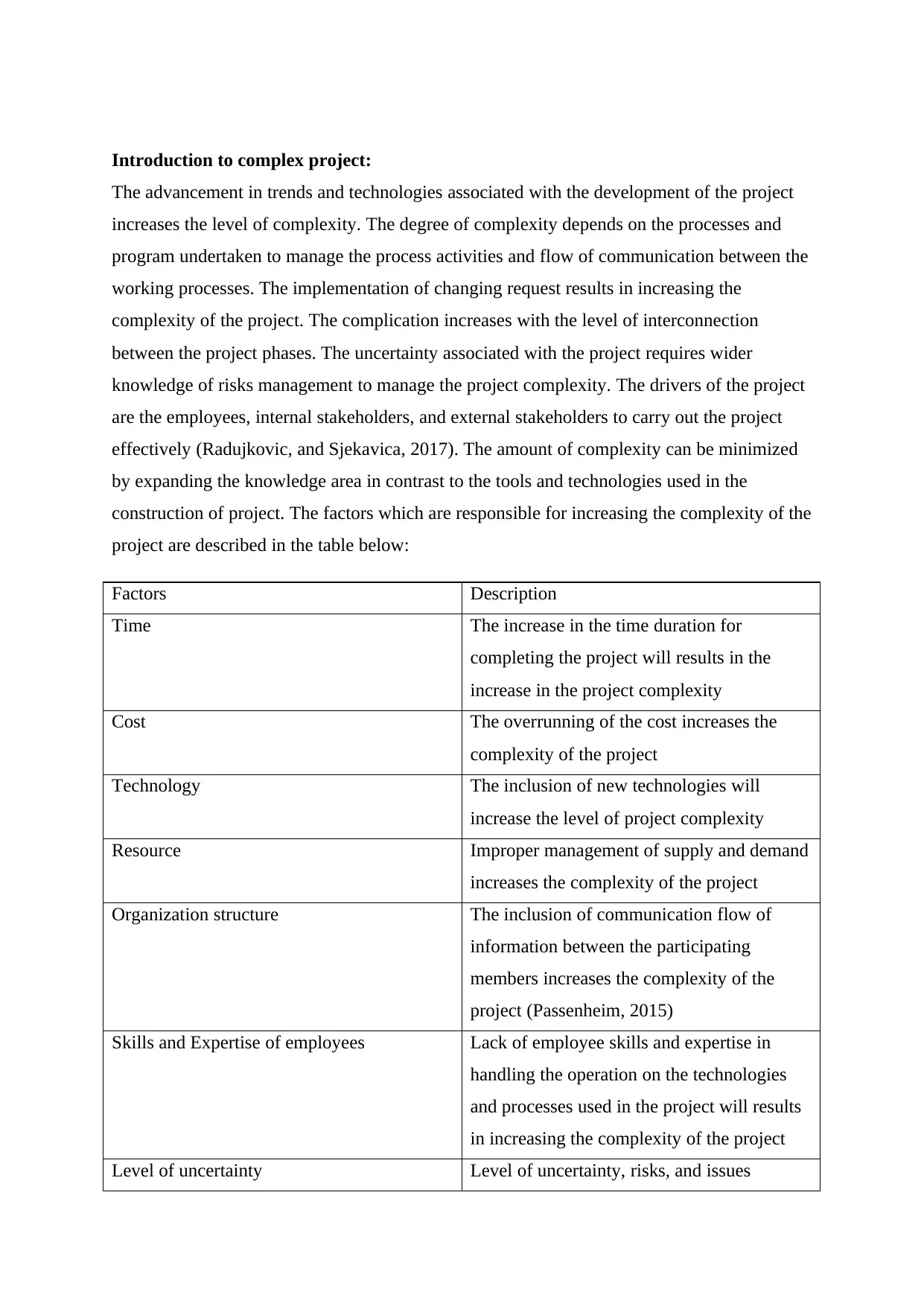
Introduction to complex project:
The advancement in trends and technologies associated with the development of the project
increases the level of complexity. The degree of complexity depends on the processes and
program undertaken to manage the process activities and flow of communication between the
working processes. The implementation of changing request results in increasing the
complexity of the project. The complication increases with the level of interconnection
between the project phases. The uncertainty associated with the project requires wider
knowledge of risks management to manage the project complexity. The drivers of the project
are the employees, internal stakeholders, and external stakeholders to carry out the project
effectively (Radujkovic, and Sjekavica, 2017). The amount of complexity can be minimized
by expanding the knowledge area in contrast to the tools and technologies used in the
construction of project. The factors which are responsible for increasing the complexity of the
project are described in the table below:
Factors Description
Time The increase in the time duration for
completing the project will results in the
increase in the project complexity
Cost The overrunning of the cost increases the
complexity of the project
Technology The inclusion of new technologies will
increase the level of project complexity
Resource Improper management of supply and demand
increases the complexity of the project
Organization structure The inclusion of communication flow of
information between the participating
members increases the complexity of the
project (Passenheim, 2015)
Skills and Expertise of employees Lack of employee skills and expertise in
handling the operation on the technologies
and processes used in the project will results
in increasing the complexity of the project
Level of uncertainty Level of uncertainty, risks, and issues
The advancement in trends and technologies associated with the development of the project
increases the level of complexity. The degree of complexity depends on the processes and
program undertaken to manage the process activities and flow of communication between the
working processes. The implementation of changing request results in increasing the
complexity of the project. The complication increases with the level of interconnection
between the project phases. The uncertainty associated with the project requires wider
knowledge of risks management to manage the project complexity. The drivers of the project
are the employees, internal stakeholders, and external stakeholders to carry out the project
effectively (Radujkovic, and Sjekavica, 2017). The amount of complexity can be minimized
by expanding the knowledge area in contrast to the tools and technologies used in the
construction of project. The factors which are responsible for increasing the complexity of the
project are described in the table below:
Factors Description
Time The increase in the time duration for
completing the project will results in the
increase in the project complexity
Cost The overrunning of the cost increases the
complexity of the project
Technology The inclusion of new technologies will
increase the level of project complexity
Resource Improper management of supply and demand
increases the complexity of the project
Organization structure The inclusion of communication flow of
information between the participating
members increases the complexity of the
project (Passenheim, 2015)
Skills and Expertise of employees Lack of employee skills and expertise in
handling the operation on the technologies
and processes used in the project will results
in increasing the complexity of the project
Level of uncertainty Level of uncertainty, risks, and issues
⊘ This is a preview!⊘
Do you want full access?
Subscribe today to unlock all pages.

Trusted by 1+ million students worldwide
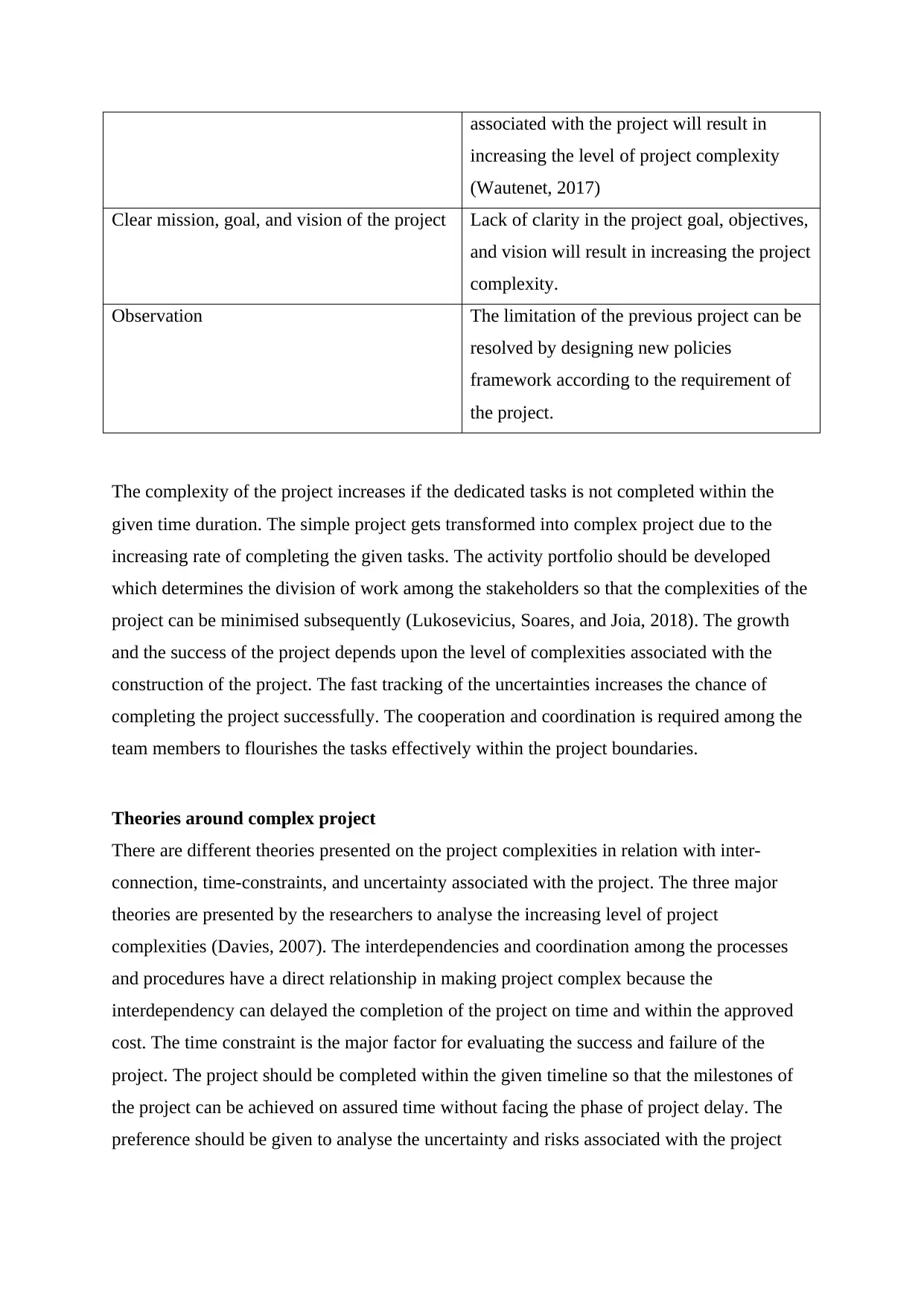
associated with the project will result in
increasing the level of project complexity
(Wautenet, 2017)
Clear mission, goal, and vision of the project Lack of clarity in the project goal, objectives,
and vision will result in increasing the project
complexity.
Observation The limitation of the previous project can be
resolved by designing new policies
framework according to the requirement of
the project.
The complexity of the project increases if the dedicated tasks is not completed within the
given time duration. The simple project gets transformed into complex project due to the
increasing rate of completing the given tasks. The activity portfolio should be developed
which determines the division of work among the stakeholders so that the complexities of the
project can be minimised subsequently (Lukosevicius, Soares, and Joia, 2018). The growth
and the success of the project depends upon the level of complexities associated with the
construction of the project. The fast tracking of the uncertainties increases the chance of
completing the project successfully. The cooperation and coordination is required among the
team members to flourishes the tasks effectively within the project boundaries.
Theories around complex project
There are different theories presented on the project complexities in relation with inter-
connection, time-constraints, and uncertainty associated with the project. The three major
theories are presented by the researchers to analyse the increasing level of project
complexities (Davies, 2007). The interdependencies and coordination among the processes
and procedures have a direct relationship in making project complex because the
interdependency can delayed the completion of the project on time and within the approved
cost. The time constraint is the major factor for evaluating the success and failure of the
project. The project should be completed within the given timeline so that the milestones of
the project can be achieved on assured time without facing the phase of project delay. The
preference should be given to analyse the uncertainty and risks associated with the project
increasing the level of project complexity
(Wautenet, 2017)
Clear mission, goal, and vision of the project Lack of clarity in the project goal, objectives,
and vision will result in increasing the project
complexity.
Observation The limitation of the previous project can be
resolved by designing new policies
framework according to the requirement of
the project.
The complexity of the project increases if the dedicated tasks is not completed within the
given time duration. The simple project gets transformed into complex project due to the
increasing rate of completing the given tasks. The activity portfolio should be developed
which determines the division of work among the stakeholders so that the complexities of the
project can be minimised subsequently (Lukosevicius, Soares, and Joia, 2018). The growth
and the success of the project depends upon the level of complexities associated with the
construction of the project. The fast tracking of the uncertainties increases the chance of
completing the project successfully. The cooperation and coordination is required among the
team members to flourishes the tasks effectively within the project boundaries.
Theories around complex project
There are different theories presented on the project complexities in relation with inter-
connection, time-constraints, and uncertainty associated with the project. The three major
theories are presented by the researchers to analyse the increasing level of project
complexities (Davies, 2007). The interdependencies and coordination among the processes
and procedures have a direct relationship in making project complex because the
interdependency can delayed the completion of the project on time and within the approved
cost. The time constraint is the major factor for evaluating the success and failure of the
project. The project should be completed within the given timeline so that the milestones of
the project can be achieved on assured time without facing the phase of project delay. The
preference should be given to analyse the uncertainty and risks associated with the project
Paraphrase This Document
Need a fresh take? Get an instant paraphrase of this document with our AI Paraphraser
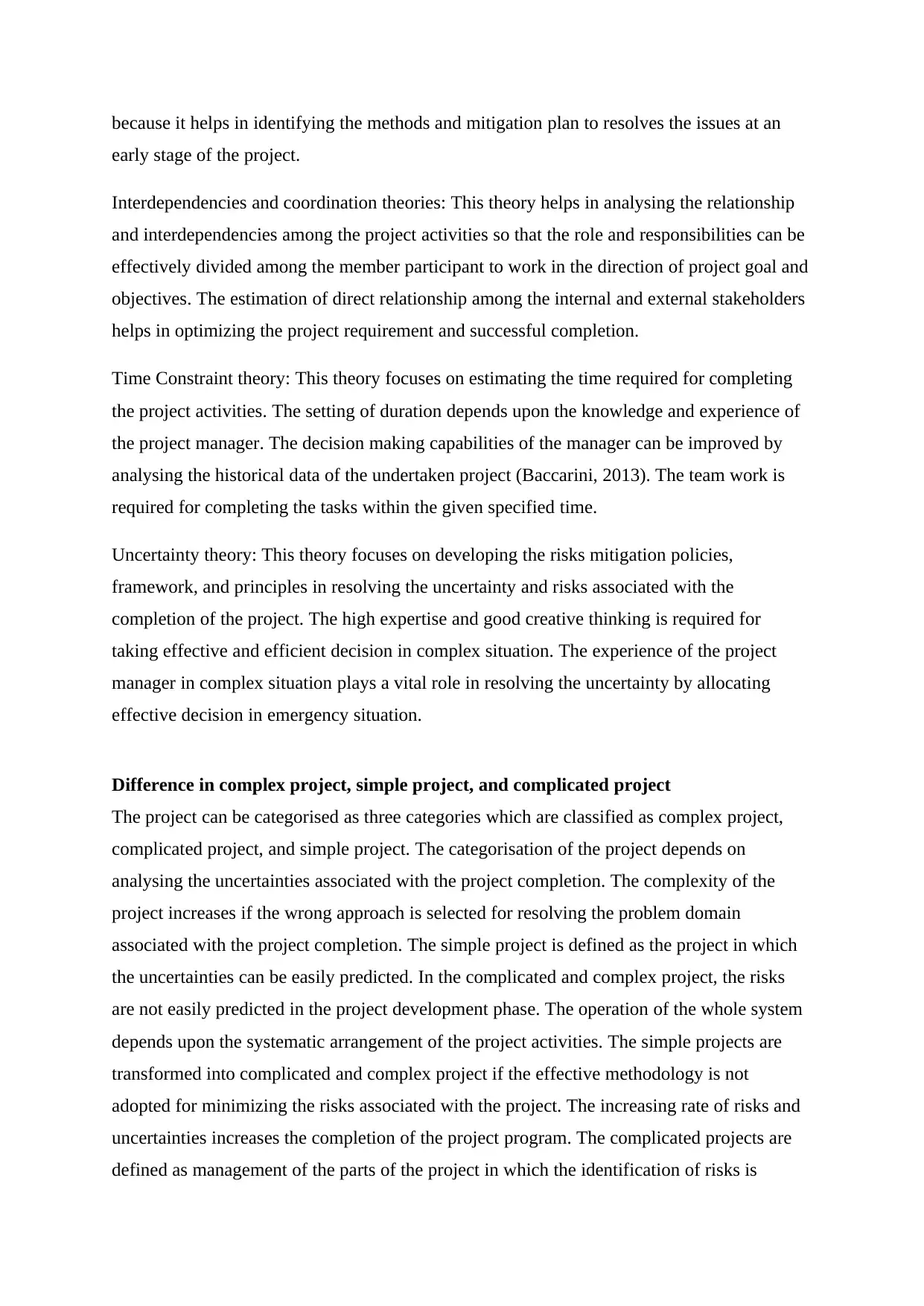
because it helps in identifying the methods and mitigation plan to resolves the issues at an
early stage of the project.
Interdependencies and coordination theories: This theory helps in analysing the relationship
and interdependencies among the project activities so that the role and responsibilities can be
effectively divided among the member participant to work in the direction of project goal and
objectives. The estimation of direct relationship among the internal and external stakeholders
helps in optimizing the project requirement and successful completion.
Time Constraint theory: This theory focuses on estimating the time required for completing
the project activities. The setting of duration depends upon the knowledge and experience of
the project manager. The decision making capabilities of the manager can be improved by
analysing the historical data of the undertaken project (Baccarini, 2013). The team work is
required for completing the tasks within the given specified time.
Uncertainty theory: This theory focuses on developing the risks mitigation policies,
framework, and principles in resolving the uncertainty and risks associated with the
completion of the project. The high expertise and good creative thinking is required for
taking effective and efficient decision in complex situation. The experience of the project
manager in complex situation plays a vital role in resolving the uncertainty by allocating
effective decision in emergency situation.
Difference in complex project, simple project, and complicated project
The project can be categorised as three categories which are classified as complex project,
complicated project, and simple project. The categorisation of the project depends on
analysing the uncertainties associated with the project completion. The complexity of the
project increases if the wrong approach is selected for resolving the problem domain
associated with the project completion. The simple project is defined as the project in which
the uncertainties can be easily predicted. In the complicated and complex project, the risks
are not easily predicted in the project development phase. The operation of the whole system
depends upon the systematic arrangement of the project activities. The simple projects are
transformed into complicated and complex project if the effective methodology is not
adopted for minimizing the risks associated with the project. The increasing rate of risks and
uncertainties increases the completion of the project program. The complicated projects are
defined as management of the parts of the project in which the identification of risks is
early stage of the project.
Interdependencies and coordination theories: This theory helps in analysing the relationship
and interdependencies among the project activities so that the role and responsibilities can be
effectively divided among the member participant to work in the direction of project goal and
objectives. The estimation of direct relationship among the internal and external stakeholders
helps in optimizing the project requirement and successful completion.
Time Constraint theory: This theory focuses on estimating the time required for completing
the project activities. The setting of duration depends upon the knowledge and experience of
the project manager. The decision making capabilities of the manager can be improved by
analysing the historical data of the undertaken project (Baccarini, 2013). The team work is
required for completing the tasks within the given specified time.
Uncertainty theory: This theory focuses on developing the risks mitigation policies,
framework, and principles in resolving the uncertainty and risks associated with the
completion of the project. The high expertise and good creative thinking is required for
taking effective and efficient decision in complex situation. The experience of the project
manager in complex situation plays a vital role in resolving the uncertainty by allocating
effective decision in emergency situation.
Difference in complex project, simple project, and complicated project
The project can be categorised as three categories which are classified as complex project,
complicated project, and simple project. The categorisation of the project depends on
analysing the uncertainties associated with the project completion. The complexity of the
project increases if the wrong approach is selected for resolving the problem domain
associated with the project completion. The simple project is defined as the project in which
the uncertainties can be easily predicted. In the complicated and complex project, the risks
are not easily predicted in the project development phase. The operation of the whole system
depends upon the systematic arrangement of the project activities. The simple projects are
transformed into complicated and complex project if the effective methodology is not
adopted for minimizing the risks associated with the project. The increasing rate of risks and
uncertainties increases the completion of the project program. The complicated projects are
defined as management of the parts of the project in which the identification of risks is
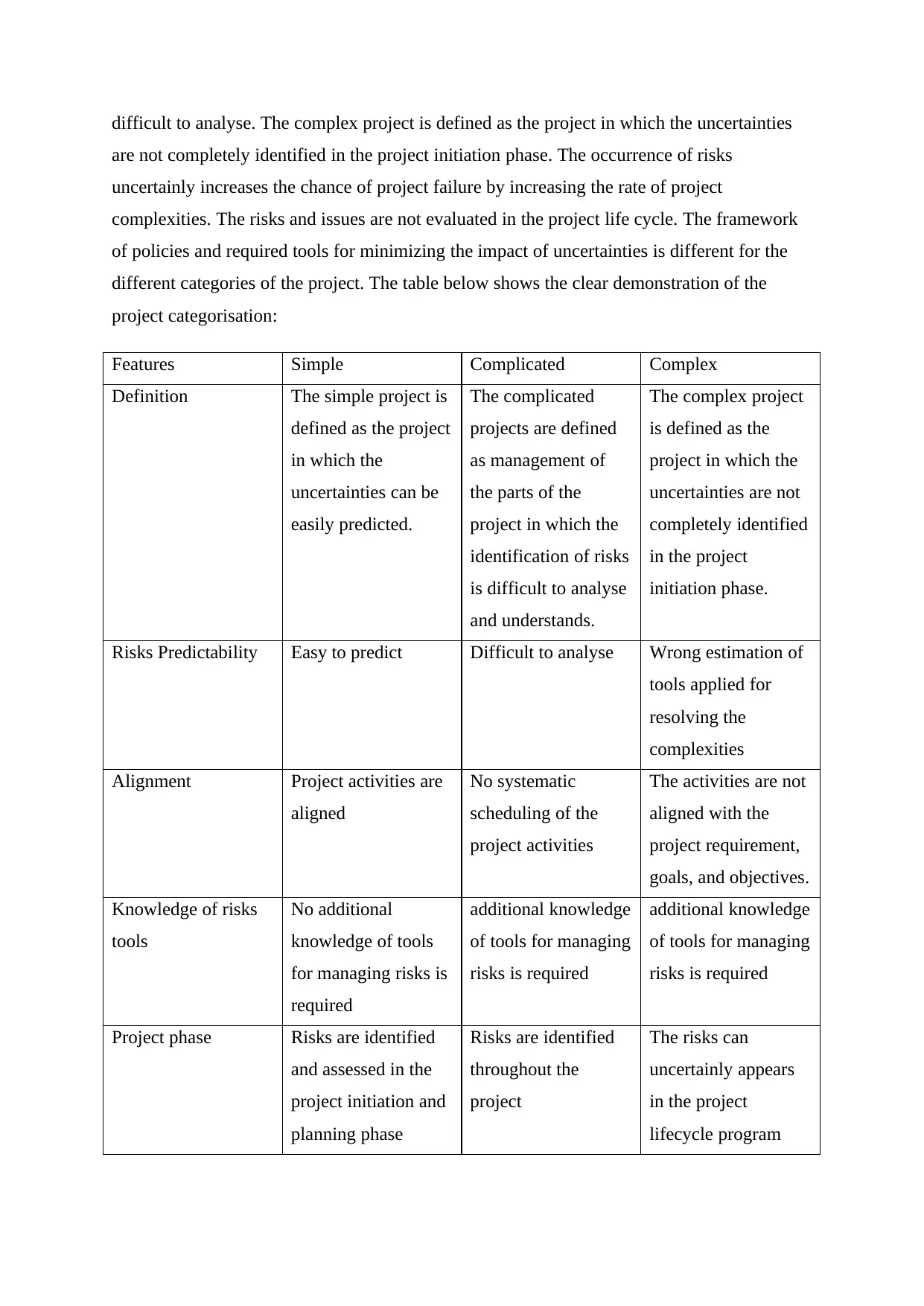
difficult to analyse. The complex project is defined as the project in which the uncertainties
are not completely identified in the project initiation phase. The occurrence of risks
uncertainly increases the chance of project failure by increasing the rate of project
complexities. The risks and issues are not evaluated in the project life cycle. The framework
of policies and required tools for minimizing the impact of uncertainties is different for the
different categories of the project. The table below shows the clear demonstration of the
project categorisation:
Features Simple Complicated Complex
Definition The simple project is
defined as the project
in which the
uncertainties can be
easily predicted.
The complicated
projects are defined
as management of
the parts of the
project in which the
identification of risks
is difficult to analyse
and understands.
The complex project
is defined as the
project in which the
uncertainties are not
completely identified
in the project
initiation phase.
Risks Predictability Easy to predict Difficult to analyse Wrong estimation of
tools applied for
resolving the
complexities
Alignment Project activities are
aligned
No systematic
scheduling of the
project activities
The activities are not
aligned with the
project requirement,
goals, and objectives.
Knowledge of risks
tools
No additional
knowledge of tools
for managing risks is
required
additional knowledge
of tools for managing
risks is required
additional knowledge
of tools for managing
risks is required
Project phase Risks are identified
and assessed in the
project initiation and
planning phase
Risks are identified
throughout the
project
The risks can
uncertainly appears
in the project
lifecycle program
are not completely identified in the project initiation phase. The occurrence of risks
uncertainly increases the chance of project failure by increasing the rate of project
complexities. The risks and issues are not evaluated in the project life cycle. The framework
of policies and required tools for minimizing the impact of uncertainties is different for the
different categories of the project. The table below shows the clear demonstration of the
project categorisation:
Features Simple Complicated Complex
Definition The simple project is
defined as the project
in which the
uncertainties can be
easily predicted.
The complicated
projects are defined
as management of
the parts of the
project in which the
identification of risks
is difficult to analyse
and understands.
The complex project
is defined as the
project in which the
uncertainties are not
completely identified
in the project
initiation phase.
Risks Predictability Easy to predict Difficult to analyse Wrong estimation of
tools applied for
resolving the
complexities
Alignment Project activities are
aligned
No systematic
scheduling of the
project activities
The activities are not
aligned with the
project requirement,
goals, and objectives.
Knowledge of risks
tools
No additional
knowledge of tools
for managing risks is
required
additional knowledge
of tools for managing
risks is required
additional knowledge
of tools for managing
risks is required
Project phase Risks are identified
and assessed in the
project initiation and
planning phase
Risks are identified
throughout the
project
The risks can
uncertainly appears
in the project
lifecycle program
⊘ This is a preview!⊘
Do you want full access?
Subscribe today to unlock all pages.

Trusted by 1+ million students worldwide
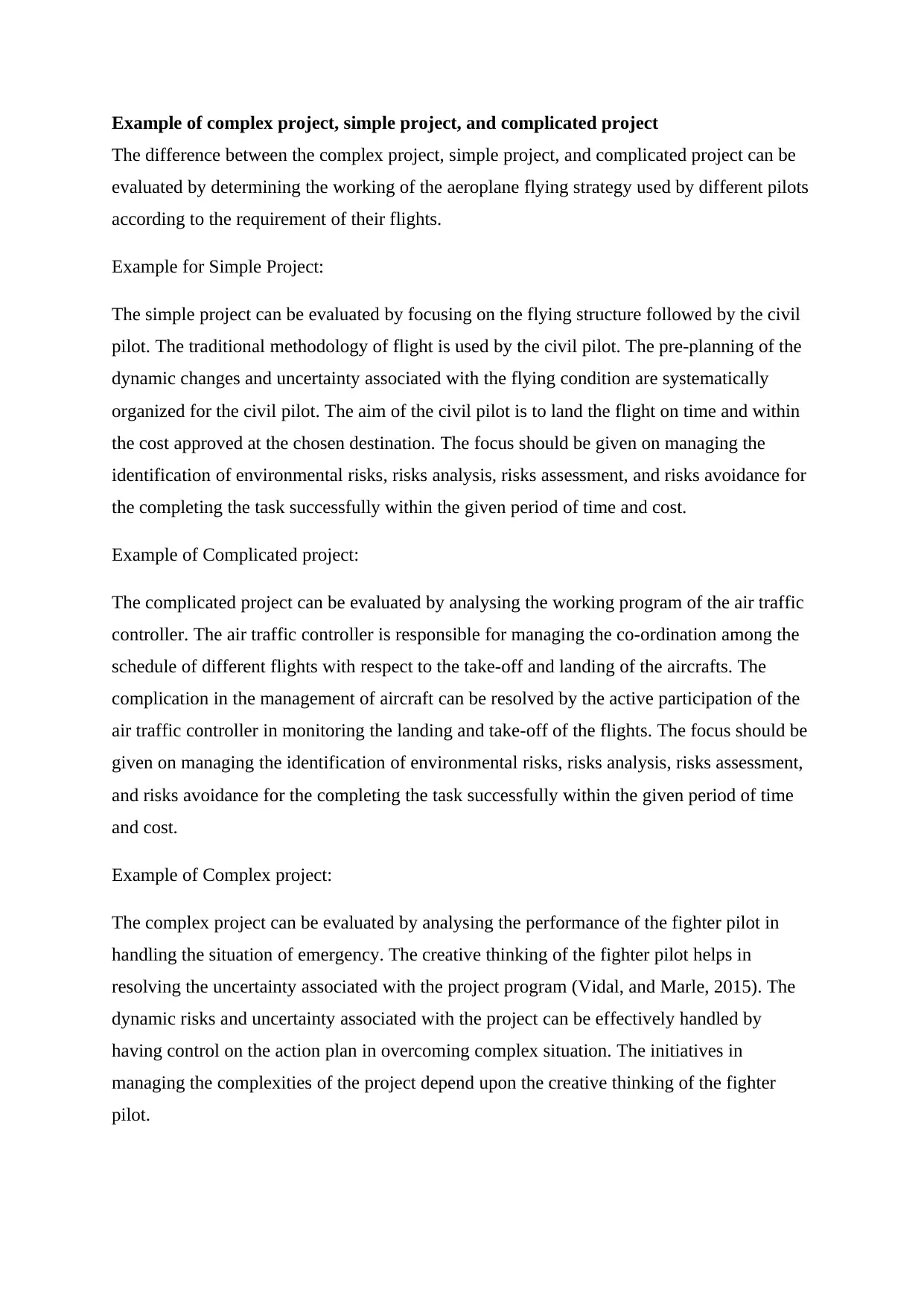
Example of complex project, simple project, and complicated project
The difference between the complex project, simple project, and complicated project can be
evaluated by determining the working of the aeroplane flying strategy used by different pilots
according to the requirement of their flights.
Example for Simple Project:
The simple project can be evaluated by focusing on the flying structure followed by the civil
pilot. The traditional methodology of flight is used by the civil pilot. The pre-planning of the
dynamic changes and uncertainty associated with the flying condition are systematically
organized for the civil pilot. The aim of the civil pilot is to land the flight on time and within
the cost approved at the chosen destination. The focus should be given on managing the
identification of environmental risks, risks analysis, risks assessment, and risks avoidance for
the completing the task successfully within the given period of time and cost.
Example of Complicated project:
The complicated project can be evaluated by analysing the working program of the air traffic
controller. The air traffic controller is responsible for managing the co-ordination among the
schedule of different flights with respect to the take-off and landing of the aircrafts. The
complication in the management of aircraft can be resolved by the active participation of the
air traffic controller in monitoring the landing and take-off of the flights. The focus should be
given on managing the identification of environmental risks, risks analysis, risks assessment,
and risks avoidance for the completing the task successfully within the given period of time
and cost.
Example of Complex project:
The complex project can be evaluated by analysing the performance of the fighter pilot in
handling the situation of emergency. The creative thinking of the fighter pilot helps in
resolving the uncertainty associated with the project program (Vidal, and Marle, 2015). The
dynamic risks and uncertainty associated with the project can be effectively handled by
having control on the action plan in overcoming complex situation. The initiatives in
managing the complexities of the project depend upon the creative thinking of the fighter
pilot.
The difference between the complex project, simple project, and complicated project can be
evaluated by determining the working of the aeroplane flying strategy used by different pilots
according to the requirement of their flights.
Example for Simple Project:
The simple project can be evaluated by focusing on the flying structure followed by the civil
pilot. The traditional methodology of flight is used by the civil pilot. The pre-planning of the
dynamic changes and uncertainty associated with the flying condition are systematically
organized for the civil pilot. The aim of the civil pilot is to land the flight on time and within
the cost approved at the chosen destination. The focus should be given on managing the
identification of environmental risks, risks analysis, risks assessment, and risks avoidance for
the completing the task successfully within the given period of time and cost.
Example of Complicated project:
The complicated project can be evaluated by analysing the working program of the air traffic
controller. The air traffic controller is responsible for managing the co-ordination among the
schedule of different flights with respect to the take-off and landing of the aircrafts. The
complication in the management of aircraft can be resolved by the active participation of the
air traffic controller in monitoring the landing and take-off of the flights. The focus should be
given on managing the identification of environmental risks, risks analysis, risks assessment,
and risks avoidance for the completing the task successfully within the given period of time
and cost.
Example of Complex project:
The complex project can be evaluated by analysing the performance of the fighter pilot in
handling the situation of emergency. The creative thinking of the fighter pilot helps in
resolving the uncertainty associated with the project program (Vidal, and Marle, 2015). The
dynamic risks and uncertainty associated with the project can be effectively handled by
having control on the action plan in overcoming complex situation. The initiatives in
managing the complexities of the project depend upon the creative thinking of the fighter
pilot.
Paraphrase This Document
Need a fresh take? Get an instant paraphrase of this document with our AI Paraphraser
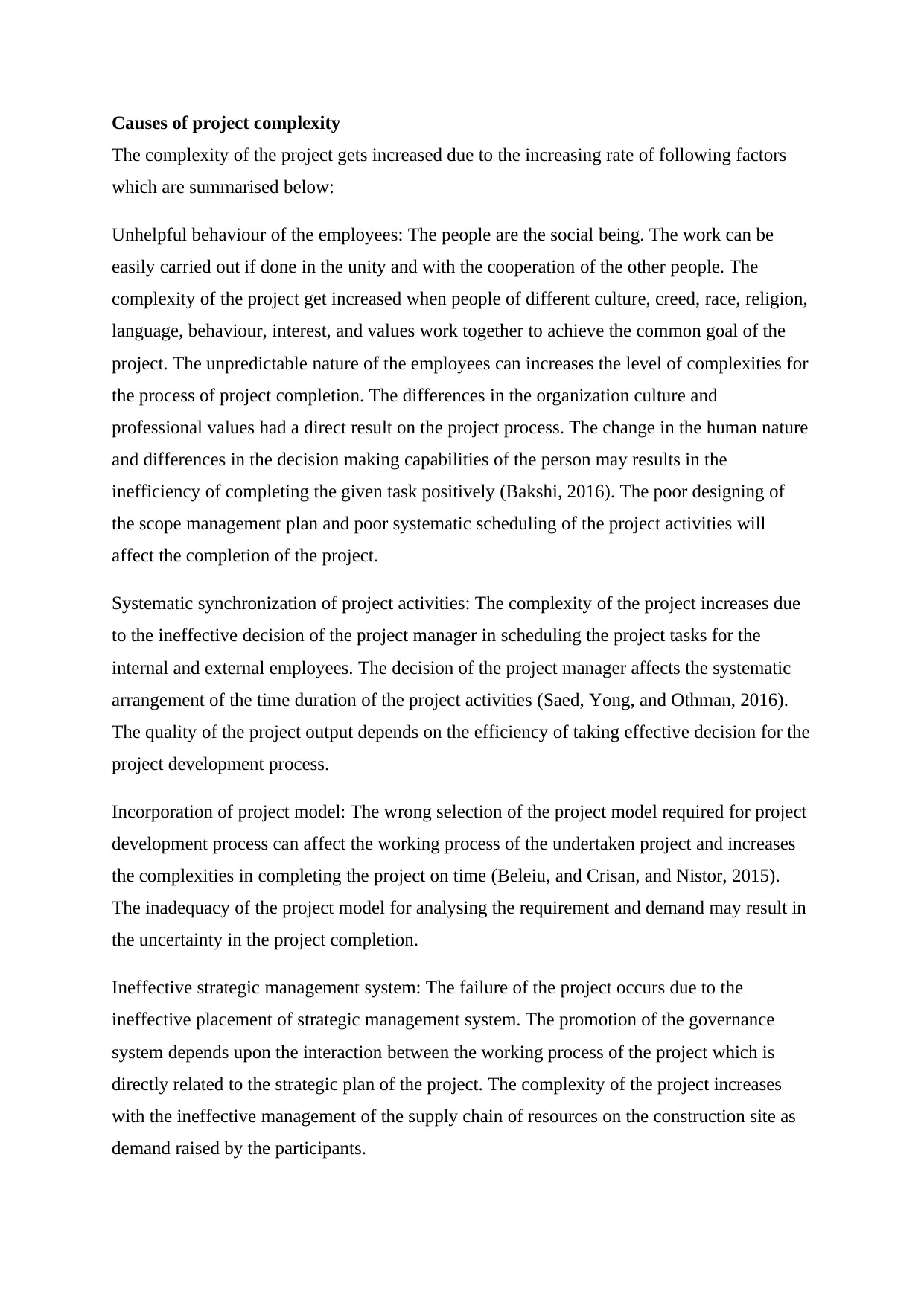
Causes of project complexity
The complexity of the project gets increased due to the increasing rate of following factors
which are summarised below:
Unhelpful behaviour of the employees: The people are the social being. The work can be
easily carried out if done in the unity and with the cooperation of the other people. The
complexity of the project get increased when people of different culture, creed, race, religion,
language, behaviour, interest, and values work together to achieve the common goal of the
project. The unpredictable nature of the employees can increases the level of complexities for
the process of project completion. The differences in the organization culture and
professional values had a direct result on the project process. The change in the human nature
and differences in the decision making capabilities of the person may results in the
inefficiency of completing the given task positively (Bakshi, 2016). The poor designing of
the scope management plan and poor systematic scheduling of the project activities will
affect the completion of the project.
Systematic synchronization of project activities: The complexity of the project increases due
to the ineffective decision of the project manager in scheduling the project tasks for the
internal and external employees. The decision of the project manager affects the systematic
arrangement of the time duration of the project activities (Saed, Yong, and Othman, 2016).
The quality of the project output depends on the efficiency of taking effective decision for the
project development process.
Incorporation of project model: The wrong selection of the project model required for project
development process can affect the working process of the undertaken project and increases
the complexities in completing the project on time (Beleiu, and Crisan, and Nistor, 2015).
The inadequacy of the project model for analysing the requirement and demand may result in
the uncertainty in the project completion.
Ineffective strategic management system: The failure of the project occurs due to the
ineffective placement of strategic management system. The promotion of the governance
system depends upon the interaction between the working process of the project which is
directly related to the strategic plan of the project. The complexity of the project increases
with the ineffective management of the supply chain of resources on the construction site as
demand raised by the participants.
The complexity of the project gets increased due to the increasing rate of following factors
which are summarised below:
Unhelpful behaviour of the employees: The people are the social being. The work can be
easily carried out if done in the unity and with the cooperation of the other people. The
complexity of the project get increased when people of different culture, creed, race, religion,
language, behaviour, interest, and values work together to achieve the common goal of the
project. The unpredictable nature of the employees can increases the level of complexities for
the process of project completion. The differences in the organization culture and
professional values had a direct result on the project process. The change in the human nature
and differences in the decision making capabilities of the person may results in the
inefficiency of completing the given task positively (Bakshi, 2016). The poor designing of
the scope management plan and poor systematic scheduling of the project activities will
affect the completion of the project.
Systematic synchronization of project activities: The complexity of the project increases due
to the ineffective decision of the project manager in scheduling the project tasks for the
internal and external employees. The decision of the project manager affects the systematic
arrangement of the time duration of the project activities (Saed, Yong, and Othman, 2016).
The quality of the project output depends on the efficiency of taking effective decision for the
project development process.
Incorporation of project model: The wrong selection of the project model required for project
development process can affect the working process of the undertaken project and increases
the complexities in completing the project on time (Beleiu, and Crisan, and Nistor, 2015).
The inadequacy of the project model for analysing the requirement and demand may result in
the uncertainty in the project completion.
Ineffective strategic management system: The failure of the project occurs due to the
ineffective placement of strategic management system. The promotion of the governance
system depends upon the interaction between the working process of the project which is
directly related to the strategic plan of the project. The complexity of the project increases
with the ineffective management of the supply chain of resources on the construction site as
demand raised by the participants.
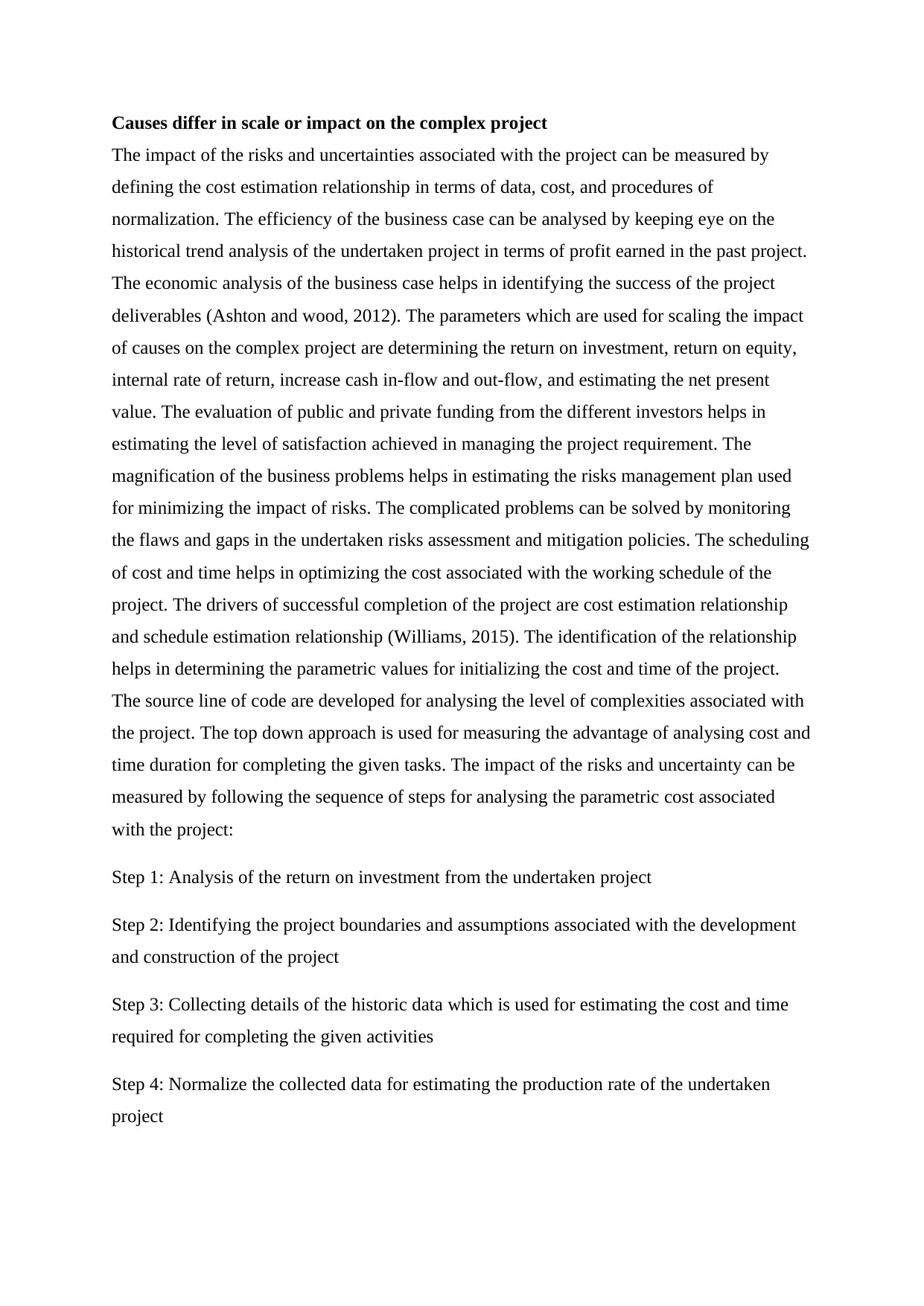
Causes differ in scale or impact on the complex project
The impact of the risks and uncertainties associated with the project can be measured by
defining the cost estimation relationship in terms of data, cost, and procedures of
normalization. The efficiency of the business case can be analysed by keeping eye on the
historical trend analysis of the undertaken project in terms of profit earned in the past project.
The economic analysis of the business case helps in identifying the success of the project
deliverables (Ashton and wood, 2012). The parameters which are used for scaling the impact
of causes on the complex project are determining the return on investment, return on equity,
internal rate of return, increase cash in-flow and out-flow, and estimating the net present
value. The evaluation of public and private funding from the different investors helps in
estimating the level of satisfaction achieved in managing the project requirement. The
magnification of the business problems helps in estimating the risks management plan used
for minimizing the impact of risks. The complicated problems can be solved by monitoring
the flaws and gaps in the undertaken risks assessment and mitigation policies. The scheduling
of cost and time helps in optimizing the cost associated with the working schedule of the
project. The drivers of successful completion of the project are cost estimation relationship
and schedule estimation relationship (Williams, 2015). The identification of the relationship
helps in determining the parametric values for initializing the cost and time of the project.
The source line of code are developed for analysing the level of complexities associated with
the project. The top down approach is used for measuring the advantage of analysing cost and
time duration for completing the given tasks. The impact of the risks and uncertainty can be
measured by following the sequence of steps for analysing the parametric cost associated
with the project:
Step 1: Analysis of the return on investment from the undertaken project
Step 2: Identifying the project boundaries and assumptions associated with the development
and construction of the project
Step 3: Collecting details of the historic data which is used for estimating the cost and time
required for completing the given activities
Step 4: Normalize the collected data for estimating the production rate of the undertaken
project
The impact of the risks and uncertainties associated with the project can be measured by
defining the cost estimation relationship in terms of data, cost, and procedures of
normalization. The efficiency of the business case can be analysed by keeping eye on the
historical trend analysis of the undertaken project in terms of profit earned in the past project.
The economic analysis of the business case helps in identifying the success of the project
deliverables (Ashton and wood, 2012). The parameters which are used for scaling the impact
of causes on the complex project are determining the return on investment, return on equity,
internal rate of return, increase cash in-flow and out-flow, and estimating the net present
value. The evaluation of public and private funding from the different investors helps in
estimating the level of satisfaction achieved in managing the project requirement. The
magnification of the business problems helps in estimating the risks management plan used
for minimizing the impact of risks. The complicated problems can be solved by monitoring
the flaws and gaps in the undertaken risks assessment and mitigation policies. The scheduling
of cost and time helps in optimizing the cost associated with the working schedule of the
project. The drivers of successful completion of the project are cost estimation relationship
and schedule estimation relationship (Williams, 2015). The identification of the relationship
helps in determining the parametric values for initializing the cost and time of the project.
The source line of code are developed for analysing the level of complexities associated with
the project. The top down approach is used for measuring the advantage of analysing cost and
time duration for completing the given tasks. The impact of the risks and uncertainty can be
measured by following the sequence of steps for analysing the parametric cost associated
with the project:
Step 1: Analysis of the return on investment from the undertaken project
Step 2: Identifying the project boundaries and assumptions associated with the development
and construction of the project
Step 3: Collecting details of the historic data which is used for estimating the cost and time
required for completing the given activities
Step 4: Normalize the collected data for estimating the production rate of the undertaken
project
⊘ This is a preview!⊘
Do you want full access?
Subscribe today to unlock all pages.

Trusted by 1+ million students worldwide
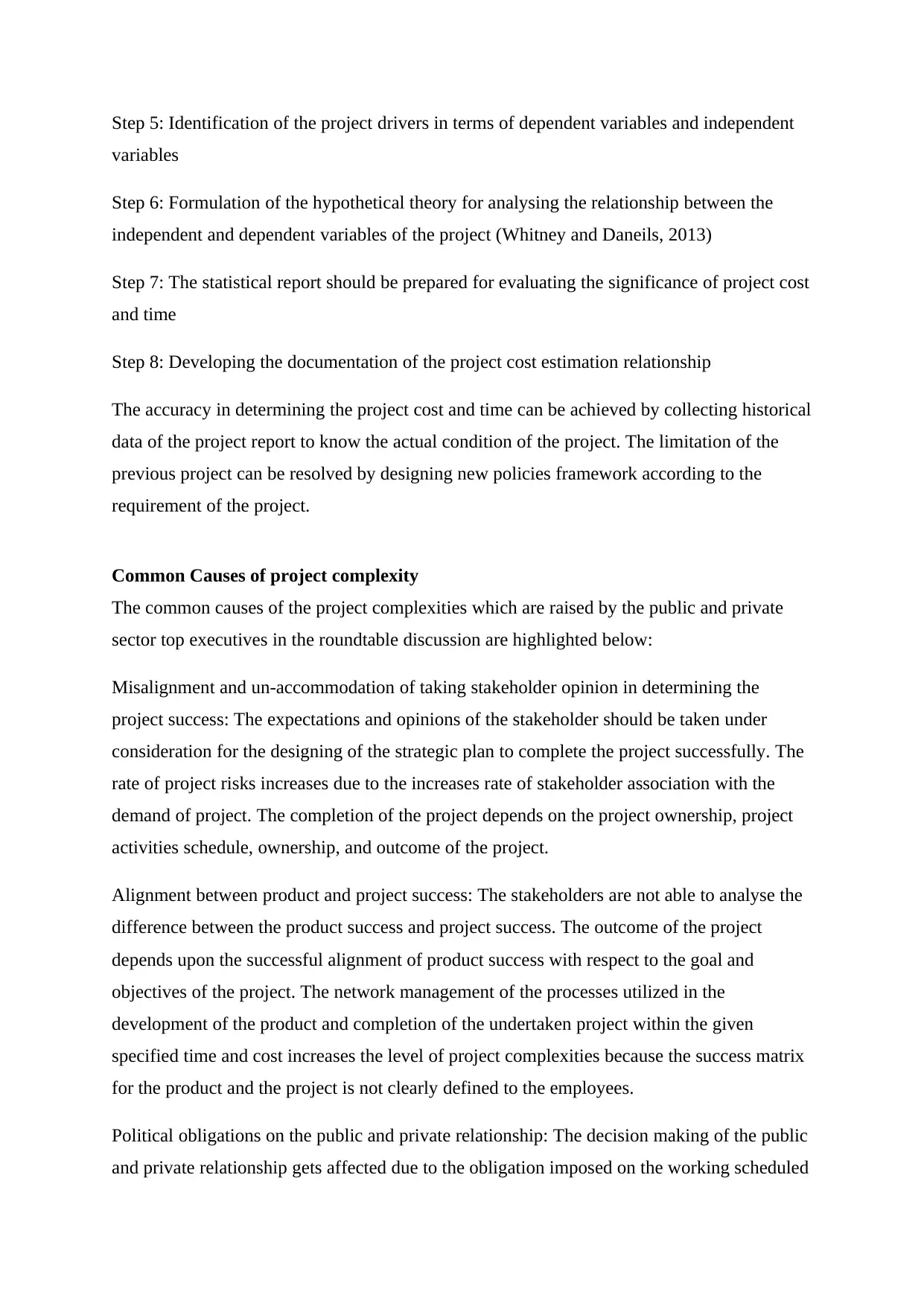
Step 5: Identification of the project drivers in terms of dependent variables and independent
variables
Step 6: Formulation of the hypothetical theory for analysing the relationship between the
independent and dependent variables of the project (Whitney and Daneils, 2013)
Step 7: The statistical report should be prepared for evaluating the significance of project cost
and time
Step 8: Developing the documentation of the project cost estimation relationship
The accuracy in determining the project cost and time can be achieved by collecting historical
data of the project report to know the actual condition of the project. The limitation of the
previous project can be resolved by designing new policies framework according to the
requirement of the project.
Common Causes of project complexity
The common causes of the project complexities which are raised by the public and private
sector top executives in the roundtable discussion are highlighted below:
Misalignment and un-accommodation of taking stakeholder opinion in determining the
project success: The expectations and opinions of the stakeholder should be taken under
consideration for the designing of the strategic plan to complete the project successfully. The
rate of project risks increases due to the increases rate of stakeholder association with the
demand of project. The completion of the project depends on the project ownership, project
activities schedule, ownership, and outcome of the project.
Alignment between product and project success: The stakeholders are not able to analyse the
difference between the product success and project success. The outcome of the project
depends upon the successful alignment of product success with respect to the goal and
objectives of the project. The network management of the processes utilized in the
development of the product and completion of the undertaken project within the given
specified time and cost increases the level of project complexities because the success matrix
for the product and the project is not clearly defined to the employees.
Political obligations on the public and private relationship: The decision making of the public
and private relationship gets affected due to the obligation imposed on the working scheduled
variables
Step 6: Formulation of the hypothetical theory for analysing the relationship between the
independent and dependent variables of the project (Whitney and Daneils, 2013)
Step 7: The statistical report should be prepared for evaluating the significance of project cost
and time
Step 8: Developing the documentation of the project cost estimation relationship
The accuracy in determining the project cost and time can be achieved by collecting historical
data of the project report to know the actual condition of the project. The limitation of the
previous project can be resolved by designing new policies framework according to the
requirement of the project.
Common Causes of project complexity
The common causes of the project complexities which are raised by the public and private
sector top executives in the roundtable discussion are highlighted below:
Misalignment and un-accommodation of taking stakeholder opinion in determining the
project success: The expectations and opinions of the stakeholder should be taken under
consideration for the designing of the strategic plan to complete the project successfully. The
rate of project risks increases due to the increases rate of stakeholder association with the
demand of project. The completion of the project depends on the project ownership, project
activities schedule, ownership, and outcome of the project.
Alignment between product and project success: The stakeholders are not able to analyse the
difference between the product success and project success. The outcome of the project
depends upon the successful alignment of product success with respect to the goal and
objectives of the project. The network management of the processes utilized in the
development of the product and completion of the undertaken project within the given
specified time and cost increases the level of project complexities because the success matrix
for the product and the project is not clearly defined to the employees.
Political obligations on the public and private relationship: The decision making of the public
and private relationship gets affected due to the obligation imposed on the working scheduled
Paraphrase This Document
Need a fresh take? Get an instant paraphrase of this document with our AI Paraphraser
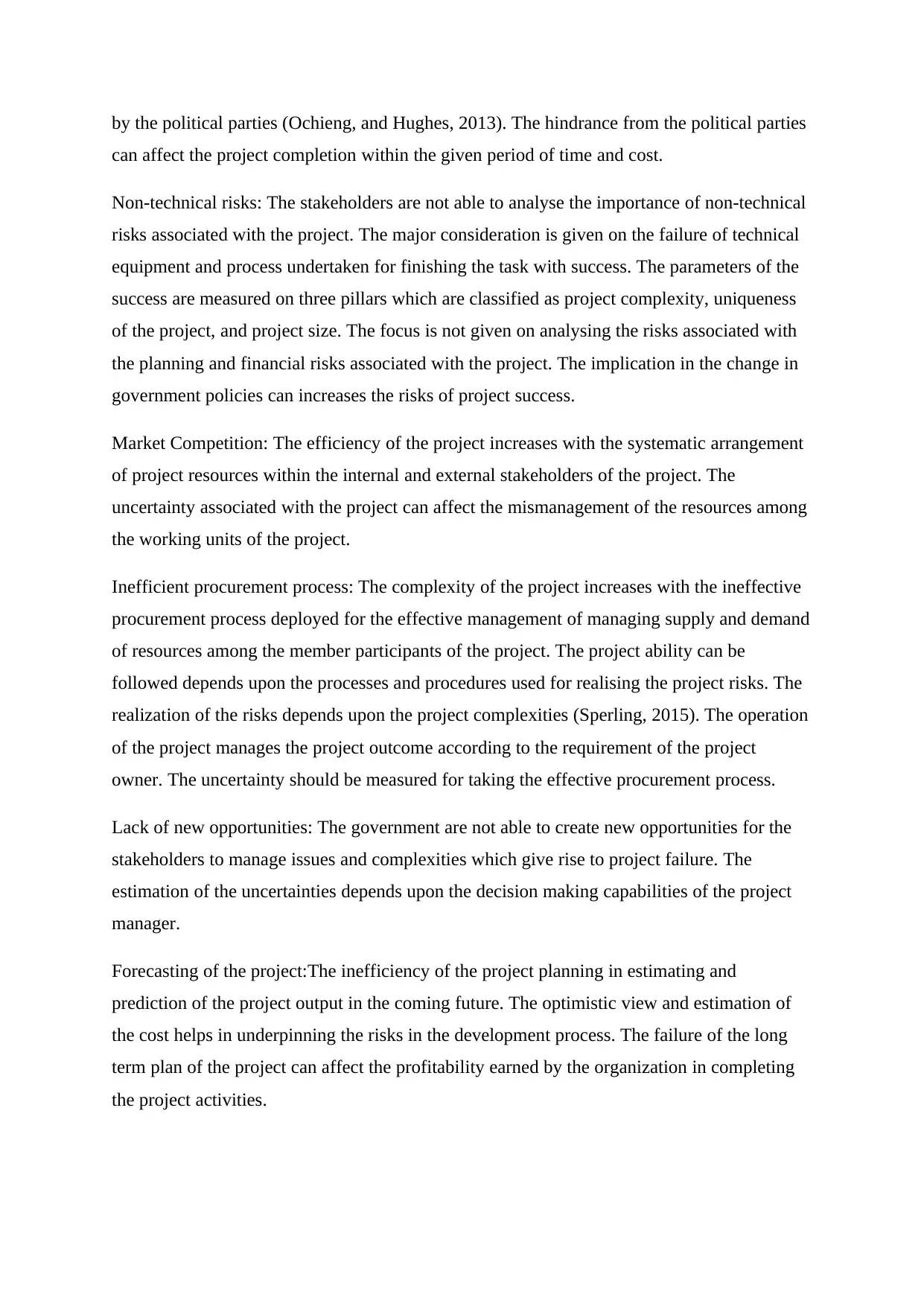
by the political parties (Ochieng, and Hughes, 2013). The hindrance from the political parties
can affect the project completion within the given period of time and cost.
Non-technical risks: The stakeholders are not able to analyse the importance of non-technical
risks associated with the project. The major consideration is given on the failure of technical
equipment and process undertaken for finishing the task with success. The parameters of the
success are measured on three pillars which are classified as project complexity, uniqueness
of the project, and project size. The focus is not given on analysing the risks associated with
the planning and financial risks associated with the project. The implication in the change in
government policies can increases the risks of project success.
Market Competition: The efficiency of the project increases with the systematic arrangement
of project resources within the internal and external stakeholders of the project. The
uncertainty associated with the project can affect the mismanagement of the resources among
the working units of the project.
Inefficient procurement process: The complexity of the project increases with the ineffective
procurement process deployed for the effective management of managing supply and demand
of resources among the member participants of the project. The project ability can be
followed depends upon the processes and procedures used for realising the project risks. The
realization of the risks depends upon the project complexities (Sperling, 2015). The operation
of the project manages the project outcome according to the requirement of the project
owner. The uncertainty should be measured for taking the effective procurement process.
Lack of new opportunities: The government are not able to create new opportunities for the
stakeholders to manage issues and complexities which give rise to project failure. The
estimation of the uncertainties depends upon the decision making capabilities of the project
manager.
Forecasting of the project:The inefficiency of the project planning in estimating and
prediction of the project output in the coming future. The optimistic view and estimation of
the cost helps in underpinning the risks in the development process. The failure of the long
term plan of the project can affect the profitability earned by the organization in completing
the project activities.
can affect the project completion within the given period of time and cost.
Non-technical risks: The stakeholders are not able to analyse the importance of non-technical
risks associated with the project. The major consideration is given on the failure of technical
equipment and process undertaken for finishing the task with success. The parameters of the
success are measured on three pillars which are classified as project complexity, uniqueness
of the project, and project size. The focus is not given on analysing the risks associated with
the planning and financial risks associated with the project. The implication in the change in
government policies can increases the risks of project success.
Market Competition: The efficiency of the project increases with the systematic arrangement
of project resources within the internal and external stakeholders of the project. The
uncertainty associated with the project can affect the mismanagement of the resources among
the working units of the project.
Inefficient procurement process: The complexity of the project increases with the ineffective
procurement process deployed for the effective management of managing supply and demand
of resources among the member participants of the project. The project ability can be
followed depends upon the processes and procedures used for realising the project risks. The
realization of the risks depends upon the project complexities (Sperling, 2015). The operation
of the project manages the project outcome according to the requirement of the project
owner. The uncertainty should be measured for taking the effective procurement process.
Lack of new opportunities: The government are not able to create new opportunities for the
stakeholders to manage issues and complexities which give rise to project failure. The
estimation of the uncertainties depends upon the decision making capabilities of the project
manager.
Forecasting of the project:The inefficiency of the project planning in estimating and
prediction of the project output in the coming future. The optimistic view and estimation of
the cost helps in underpinning the risks in the development process. The failure of the long
term plan of the project can affect the profitability earned by the organization in completing
the project activities.
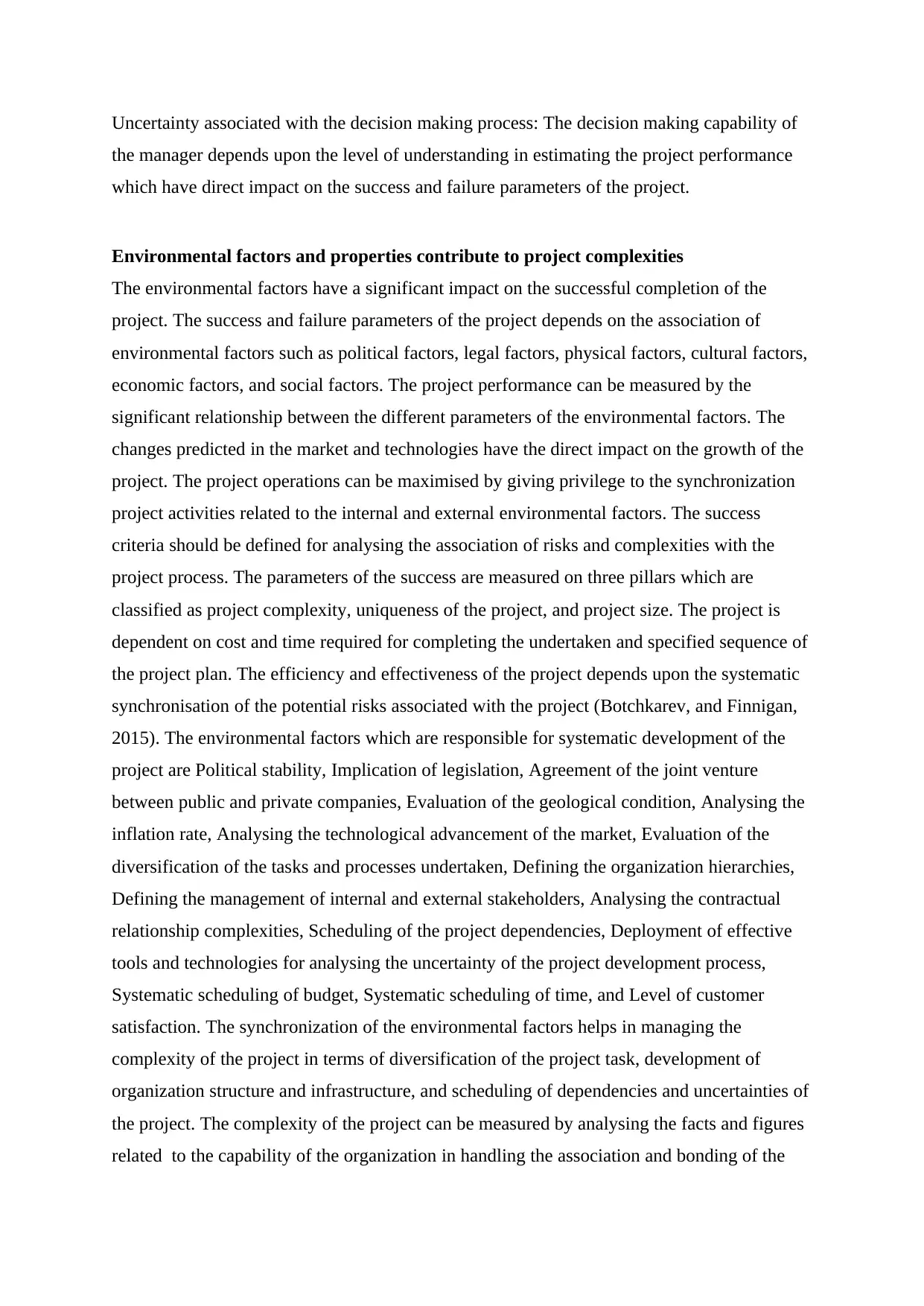
Uncertainty associated with the decision making process: The decision making capability of
the manager depends upon the level of understanding in estimating the project performance
which have direct impact on the success and failure parameters of the project.
Environmental factors and properties contribute to project complexities
The environmental factors have a significant impact on the successful completion of the
project. The success and failure parameters of the project depends on the association of
environmental factors such as political factors, legal factors, physical factors, cultural factors,
economic factors, and social factors. The project performance can be measured by the
significant relationship between the different parameters of the environmental factors. The
changes predicted in the market and technologies have the direct impact on the growth of the
project. The project operations can be maximised by giving privilege to the synchronization
project activities related to the internal and external environmental factors. The success
criteria should be defined for analysing the association of risks and complexities with the
project process. The parameters of the success are measured on three pillars which are
classified as project complexity, uniqueness of the project, and project size. The project is
dependent on cost and time required for completing the undertaken and specified sequence of
the project plan. The efficiency and effectiveness of the project depends upon the systematic
synchronisation of the potential risks associated with the project (Botchkarev, and Finnigan,
2015). The environmental factors which are responsible for systematic development of the
project are Political stability, Implication of legislation, Agreement of the joint venture
between public and private companies, Evaluation of the geological condition, Analysing the
inflation rate, Analysing the technological advancement of the market, Evaluation of the
diversification of the tasks and processes undertaken, Defining the organization hierarchies,
Defining the management of internal and external stakeholders, Analysing the contractual
relationship complexities, Scheduling of the project dependencies, Deployment of effective
tools and technologies for analysing the uncertainty of the project development process,
Systematic scheduling of budget, Systematic scheduling of time, and Level of customer
satisfaction. The synchronization of the environmental factors helps in managing the
complexity of the project in terms of diversification of the project task, development of
organization structure and infrastructure, and scheduling of dependencies and uncertainties of
the project. The complexity of the project can be measured by analysing the facts and figures
related to the capability of the organization in handling the association and bonding of the
the manager depends upon the level of understanding in estimating the project performance
which have direct impact on the success and failure parameters of the project.
Environmental factors and properties contribute to project complexities
The environmental factors have a significant impact on the successful completion of the
project. The success and failure parameters of the project depends on the association of
environmental factors such as political factors, legal factors, physical factors, cultural factors,
economic factors, and social factors. The project performance can be measured by the
significant relationship between the different parameters of the environmental factors. The
changes predicted in the market and technologies have the direct impact on the growth of the
project. The project operations can be maximised by giving privilege to the synchronization
project activities related to the internal and external environmental factors. The success
criteria should be defined for analysing the association of risks and complexities with the
project process. The parameters of the success are measured on three pillars which are
classified as project complexity, uniqueness of the project, and project size. The project is
dependent on cost and time required for completing the undertaken and specified sequence of
the project plan. The efficiency and effectiveness of the project depends upon the systematic
synchronisation of the potential risks associated with the project (Botchkarev, and Finnigan,
2015). The environmental factors which are responsible for systematic development of the
project are Political stability, Implication of legislation, Agreement of the joint venture
between public and private companies, Evaluation of the geological condition, Analysing the
inflation rate, Analysing the technological advancement of the market, Evaluation of the
diversification of the tasks and processes undertaken, Defining the organization hierarchies,
Defining the management of internal and external stakeholders, Analysing the contractual
relationship complexities, Scheduling of the project dependencies, Deployment of effective
tools and technologies for analysing the uncertainty of the project development process,
Systematic scheduling of budget, Systematic scheduling of time, and Level of customer
satisfaction. The synchronization of the environmental factors helps in managing the
complexity of the project in terms of diversification of the project task, development of
organization structure and infrastructure, and scheduling of dependencies and uncertainties of
the project. The complexity of the project can be measured by analysing the facts and figures
related to the capability of the organization in handling the association and bonding of the
⊘ This is a preview!⊘
Do you want full access?
Subscribe today to unlock all pages.

Trusted by 1+ million students worldwide
1 out of 21
Related Documents
Your All-in-One AI-Powered Toolkit for Academic Success.
+13062052269
info@desklib.com
Available 24*7 on WhatsApp / Email
![[object Object]](/_next/static/media/star-bottom.7253800d.svg)
Unlock your academic potential
Copyright © 2020–2025 A2Z Services. All Rights Reserved. Developed and managed by ZUCOL.




